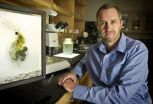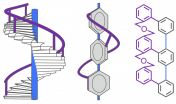Not all elderly Americans will surf to health
'Digital divide' could sideline older Americans when it comes to health information on the internet
2014-11-12
(Press-News.org) Providing health information on the internet may not be the "cure all" that it is hoped to be. It could sideline especially those Americans older than 65 years old who are not well versed in understanding health matters, and who do not use the web regularly. So says Helen Levy of the University of Michigan in the US, who led the first-ever study to show that elderly people's knowledge of health matters, so-called health literacy, also predicts how and if they use the internet. The findings¹ appear in the Journal of General Internal Medicine², published by Springer.
Substantial resources and attention have been invested recently in health information technology in the US, for example by providing electronic medical records online. It is unclear, however, whether elderly patients are willing and able to put this innovation to full use. Levy's team therefore sought to establish if there is a link between people's levels of health literacy and their use of the internet to find information.
Data was analyzed from the 2009 and 2010 Health and Retirement Study, a nationally representative survey of more than 20,000 Americans 65 years and older. Approximately 1,400 of the participants were queried about how often they used the internet for whatever purpose and, in particular, how often they searched for health and medical information. Their health literacy was assessed using the revised Rapid Estimate of Adult Literacy in Medicine questionnaire. They also rated how confident they felt about filling out medical forms.
The analysis revealed that the internet was a port of call to gain health information for 31.9 percent of the elderly participants who were well versed in health matters, while only 9.7 percent of those with low health literacy used it. Elderly Americans with low health literacy are less likely to use the internet at all. If members of this group do surf the web, it is generally not to search for medical or health information. Health literacy was therefore found to be a significant predictor of what people do once they are online.
The analysis also showed that a person's level of health literacy is a more important predictor of whether he or she will use the internet to get medical or health information rather than his or her cognitive functioning. Levy therefore suggests that interventions specifically targeting health literacy among older adults may help prevent a widening of the "digital divide" as patients are increasingly expected to obtain medical information online.
"Health information technology, like any innovation in health care, offers both the promise of significant benefits and the risk that these benefits will not be shared equally," warns Levy. "Low health literacy may attenuate the effectiveness of web-based interventions to improve the health of vulnerable populations."
INFORMATION:
References:
1. Levy, H., Janke, A.T., Langa, K.M. (2014). Health Literacy and the Digital Divide among Older Americans, Journal of General Internal Medicine. DOI 10.1007/s11606-014-3069-5
2. The Journal of General Internal Medicine is the official journal of the Society of General Internal Medicine.
ELSE PRESS RELEASES FROM THIS DATE:
2014-11-12
Learning a new language changes your brain network both structurally and functionally, according to Penn State researchers.
"Learning and practicing something, for instance a second language, strengthens the brain," said Ping Li, professor of psychology, linguistics and information sciences and technology. "Like physical exercise, the more you use specific areas of your brain, the more it grows and gets stronger."
Li and colleagues studied 39 native English speakers' brains over a six-week period as half of the participants learned Chinese vocabulary. Of the subjects ...
2014-11-12
The tree has been an effective model of evolution for 150 years, but a Rice University computer scientist believes it's far too simple to illustrate the breadth of current knowledge.
Rice researcher Luay Nakhleh and his group have developed PhyloNet, an open-source software package that accounts for horizontal as well as vertical inheritance of genetic material among genomes. His "maximum likelihood" method, detailed this month in the Proceedings of the National Academy of Sciences, allows PhyloNet to infer network models that better describe the evolution of certain ...
2014-11-12
Most community-based mental health providers are not well prepared to take care of the special needs of military veterans and their families, according to a new study by the RAND Corporation that was commissioned by United Health Foundation in collaboration with the Military Officers Association of America.
The exploratory report, based on a survey of mental health providers nationally, found few community-based providers met criteria for military cultural competency or used evidence-based approaches to treat problems commonly seen among veterans.
"Our findings suggest ...
2014-11-12
A new study from The University of Texas at Arlington biologists examining non-genetic changes in water flea development suggests something human parents have known for years - ensuring a future generations' success often means sacrifice.
Matthew Walsh, an assistant professor of biology, and his team looked at a phenomenon called "phenotypic plasticity" in the Daphnia abigua, or water flea. Phenotypic plasticity is when an organism changes its trait expressions or physical characteristics, or those of its offspring, because of external factors. In Daphnia, that can mean ...
2014-11-12
Chemists at the University of Basel in Switzerland have succeeded in twisting a molecule by combining molecular strands of differing lengths. The longer strand winds around a central axis like a staircase banister, creating a helical structure that exhibits special physical properties. The results were published in the renowned scientific journal Angewandte Chemie International Edition.
The chemistry of all substances is to a large extent defined by their spatial arrangement. Many molecules can be present in two forms (enantiomers), which behave like a person's right ...
2014-11-12
November 12, 2014 - In preschool-aged children, a simple test performed in the ophthalmologist's or optometrist's office greatly overestimates the eye's ability to "flex and focus" in order to see small objects clearly, reports a study in the November issue of END ...
2014-11-12
Nanomedicine is offering patients a growing arsenal of therapeutic drugs for a variety of diseases but often at a cost of thousands of dollars a month. Generics could substantially reduce the price tag for patients -- if only there were a well-defined way to make and regulate them. An article in Chemical & Engineering News (C&EN), the weekly newsmagazine of the American Chemical Society, details the challenges on the road to generic nanodrugs.
Matt Davenport, a C&EN contributing editor, points out that in small-molecule therapeutics -- aspirin, for example -- the active ...
2014-11-12
The loss of eyesight, often caused by retinal degeneration, is a life-altering health issue for many people, especially as they age. But a new development toward a prosthetic retina could help counter conditions that result from problems with this crucial part of the eye. Scientists published their research on a new device, which they tested on tissue from laboratory animals, in the ACS journal Nano Letters.
Yael Hanein and colleagues point out that a growing range of medical devices has become available to treat conditions, including visual impairment, that involve sending ...
2014-11-12
COLUMBIA, MO. - Sugar-sweetened beverages are the largest source of added sugar in the diets of adolescents in the United States, and young adults ages 15-20 consume more of these drinks than any other age group, according to the Centers for Disease Control and Prevention. Adolescent obesity rates, which have quadrupled over the past thirty years, led to widespread scrutiny of added dietary sugars, especially those found in carbonated beverages. Now, MU researchers have found that short-term, moderate consumption of high-fructose and high-glucose beverages has little impact ...
2014-11-12
INDIANAPOLIS -- People with a newly identified genetic variant perform better on certain types of memory tests, a discovery that may point the way to new treatments for the memory impairments caused by Alzheimer's disease or other age-associated conditions.
In what the international research team is calling the largest study to date of human memory, an analysis of genomic data and memory test results from more than 14,000 older adults identified a location in the genome that was associated with better memory performance. The researchers noted that the gene has not been ...
LAST 30 PRESS RELEASES:
[Press-News.org] Not all elderly Americans will surf to health
'Digital divide' could sideline older Americans when it comes to health information on the internet



